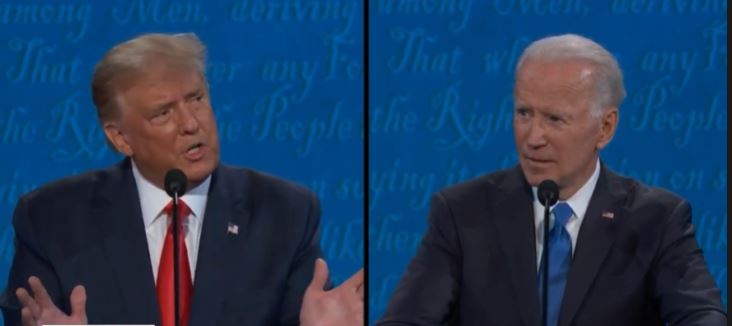
U.S. Sen. Russ Feingold (D-Wis.) and his Republican challenger, Oshkosh businessman Ron Johnson, squared off in their final debate before the Nov. 2 Election Day at Marquette University Law School’s Eckstein Hall Friday night.
Johnson preached a small government, low tax rhetoric, attacking Feingold’s spending record and support of the “failed” stimulus package and health care reform. Feingold, a Janesville native, touted his 18 years of Congressional experience and bipartisan voting record. Throughout the evening, he emphasized Johnson’s lack of political experience and specific plans.
The event, entitled UPFRONT Town Hall Challenge, was broadcast statewide by WISN and moderated by Mike Gousha, distinguished fellow of law & policy. He solicited questions from citizen groups across the state. They grilled the candidates on topics including social security, agriculture, education and health care.
Johnson fielded the first question and said America’s growing debt is the greatest threat the country faces today.
“Over $3 trillion have been added to the debt in just the last three years, and Sen. Feingold has voted for all that,” he said.
Feingold said Johnson has mischaracterized both his spending and voting record in campaign advertisements.
“Of course the debt is one of the biggest issues,” Feingold said. “That’s why I have worked so hard to reduce the debt and deficit, and successfully did so with President Clinton and Republicans in the 1990s.”
Feingold and Johnson’s stark contrast in governing philosophies was apparent throughout the debate. Johnson referenced his 31 years as a small business owner on multiple occasions and said Washington’s “career politicians” just don’t get it.
“The premise for (the stimulus package) was that ‘government can actually create jobs – the government can actually create long-term, self-sustaining jobs,’ – and that’s just wrong,” Johnson said. “It’s the private sector that creates long-term, sustainable jobs.”
Feingold, who holds town hall meetings in all 72 Wisconsin counties each year, said Johnson may know his own business, but does not have the broad perspective Feingold has gained through years of experience. He supported health care reform after hearing “the constant complaints from Wisconsin businesses that the insurance industry was destroying their ability to cover their own employees.”
“That’s the ultimate pro-business position, and that’s why I fight for them,” Feingold said.
Julia Azari, an assistant professor of political science and elections specialist, agreed that Johnson seems overly focused on Wisconsin and business matters.
“He’s running for the U.S. Senate in a year when the conventional wisdom suggests that non-incumbents should emphasize national issues,” she said. “The economy is really important right now, of course, but the Senate deals with much more than economic policy.”
Feingold defended his support of the stimulus bill.
“The fact is, I voted to cut taxes,” Feingold said. “He says the recovery bill did nothing? It provided a tax cut to 95 percent of all working families that are Americans – some $250 billion in tax cuts.”
Johnson called himself a “main street” small business owner who pays $500,000 in his employees’ health care benefits each year. The legislation passed under President Barack Obama has created a great deal of uncertainty, he said.
“When the government spends money, eventually they’re going to have to take money,” Johnson said. “Taxes are going to have to go up, or inflation is going to explode.”
Johnson and Feingold offered contrasting solutions to nearly every issue, from exiting Afghanistan to extending President Bush’s tax cuts. However, the two agreed that states should have greater control of education policies and the Internal Revenue Service tax code must be simplified.
Johnson is leading with 51 points to Feingold’s 45, according to Pollster.com. Since Obama took office, conservatives have been reenergized and the Tea Party emerged.
“Major Republican victories are to be expected this year to offset Democratic gains,” Azari said. “It happened to Ronald Reagan and the Republicans in 1982, and it will happen now.
“If Johnson wins, he’ll get a committee assignment and have a lot of learning to do.”




